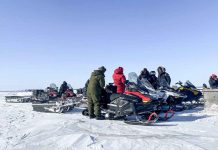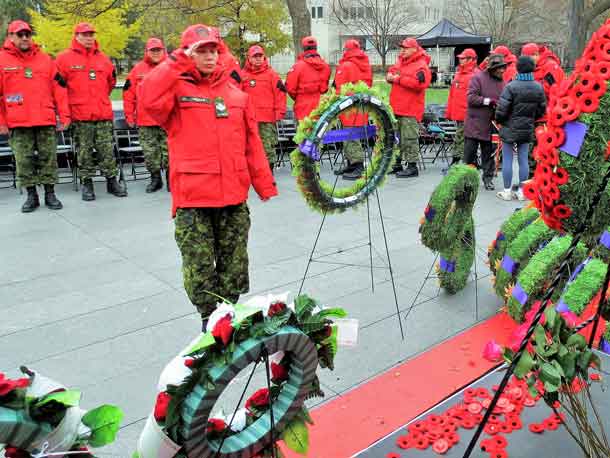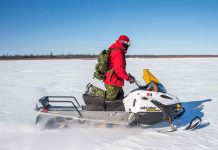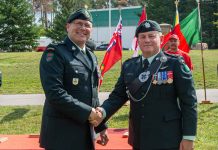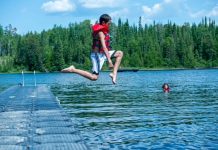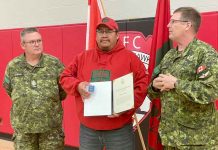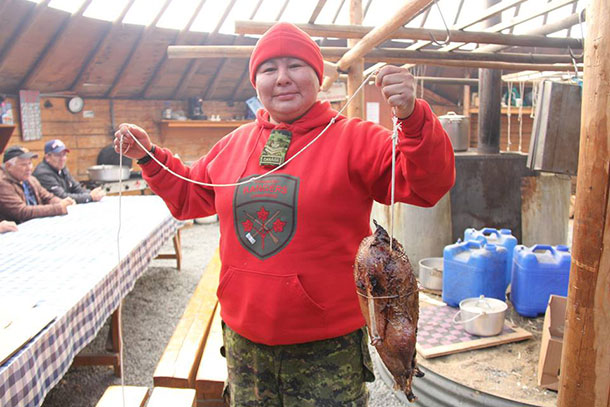

THUNDER BAY – Canadian Rangers from four Cree communities on the Ontario side of James Bay have completed a first-ever patrol to a Cree community – Waskaganish – on the Quebec side of the bay.
“Everyone enjoyed it,” said Sergeant Victor Rickard of Moose Factory, “it was a great experience and I’d do it again. It was a first time for everyone going across to the Quebec side by snowmobile in the winter.”
There were 19 Rangers and one army instructor on the patrol. The Rangers were from Attawapiskat, Fort Albany, Kashechewan, and Moose Factory. Many had relatives living in Waskaganish.
“I got to see my uncle and my cousin,” said Ranger Ruby Edwards-Wheesk of Fort Albany. “It was a chance of a life time to get there by snowmobile. The only other time I got to Waskaganish was on a charter flight for a hockey game.”
Apart from giving the Rangers an opportunity to visit relatives in Waskaganish and meet members of the local Ranger patrol and community members, the patrol had a serious military purpose.
“One of the reasons for the patrol was to allow our Rangers to practice moving in a group across different types of terrain,” said Warrant Officer Carl Wolfe, an army instructor. “They travelled on the winter road, over sea ice, in deep snow, slush, swamp, and over hills, rivers, lakes, and streams, in an area few had seen anything of before”.
“It was a challenge. We also had to deal with the weather. We had white-outs and temperatures in the minus 20s and minus 30s. Visibility was an issue because of the snow and the wind.”
The patrol challenged the Rangers’ navigation skills and gave them an opportunity to familiarize themselves with a rarely travelled area of land between Moose Factory and Waskaganish. “We might have to work in that area with the Waskaganish patrol in an emergency, such as a plane crash,” Warrant Officer Wolfe said. “So this was a good experience for our Rangers.”
“We need to get to know the territory between Moose Factory and Waskaganish,” said Sergeant William Hestor, commander of the Waskaganish Ranger patrol. “We need to know both the coastal areas and also how to get across the land in the winter. We need to learn from training together.”
A joint exercise for the rarely visited area is planned for next winter, Warrant Officer Wolfe said.
The patrol was met at the Ontario-Quebec border by two Rangers from Waskaganish who acted as guides for the rest of the trip to Waskaganish. The Ontario Rangers spent two nights in Waskaganish, where they were stayed in the homes of relatives or community volunteers.
“They went all out for us,” said Ranger Edwards-Wheesk. “We were welcomed on our arrival by the deputy chief, Thomas Hester; the Ranger sergeant, William Hester; Elders, their Rangers, and members of the community, including a lot of relatives.”
A highlight of the visit was a feast. The Ontario Rangers brought moose meat and geese and the Waskaganish Rangers supplied beaver and partridge, as well as bannock and tea. All the Ontario Rangers received small tamarisk goose decoys and Waskaganish ball caps as gifts.
(Sergeant Peter Moon is the public affairs ranger for 3rd Canadian Ranger Patrol Group at Canadian Forces Base Borden.)

